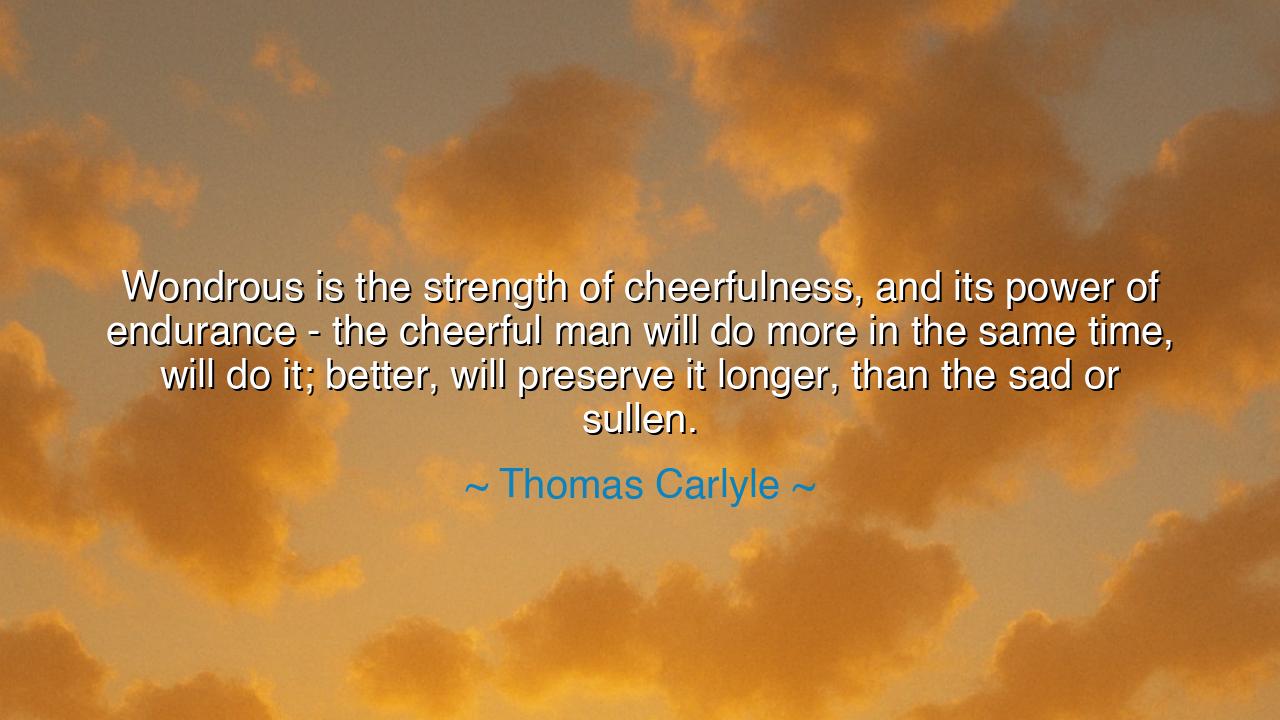
Wondrous is the strength of cheerfulness, and its power of
Wondrous is the strength of cheerfulness, and its power of endurance - the cheerful man will do more in the same time, will do it; better, will preserve it longer, than the sad or sullen.






In the deep well of human experience, Thomas Carlyle, the sage of endurance and moral fire, once declared: “Wondrous is the strength of cheerfulness, and its power of endurance — the cheerful man will do more in the same time, will do it better, will preserve it longer, than the sad or sullen.” In these words lies not mere optimism, but a revelation — that cheerfulness is not a shallow smile, but a hidden strength of the soul, a quiet force that defies despair and makes labor a joy rather than a burden. Carlyle, who lived through the dark storms of doubt and industrial hardship, saw that in the furnace of life, it is not the strongest who endure, but the brightest of spirit, whose hearts remain warm even when the world turns cold.
To the ancients, the cheerful heart was a sacred power, akin to divine fire. They called it thumos, the vital energy that stirs the soul to noble deeds. For Carlyle, cheerfulness was not mere mirth or laughter, but a disciplined serenity — the ability to face life’s trials with courage and light. He looked upon the weary workers of his time, the poets and craftsmen bent beneath the weight of toil, and he saw that those who kept a radiant spirit outlasted those who brooded in bitterness. In this, he echoed an eternal law of being: the spirit that smiles, even in darkness, draws strength from sources unseen.
Consider the story of Ernest Shackleton, the Antarctic explorer whose ship, Endurance, was crushed by ice. Trapped in the frozen wastes, with death pressing on every side, Shackleton did not yield to despair. Instead, he kept his men’s spirits alive through humor, hope, and cheerfulness. He sang with them, told stories, and shared every hardship as their equal. It was said that his laughter, echoing over the ice, gave warmth to men who had none. Through his cheerful endurance, all his crew survived — a miracle not of strength, but of spirit. Thus was Carlyle’s wisdom proven true: the cheerful heart endures where grim resolve alone would perish.
For sadness and sullenness, though they may seem profound, are quicksands to the will. They drain vigor, cloud judgment, and turn even small obstacles into mountains. The cheerful, however, are buoyant; they rise as water rises, lifting themselves and others through their very presence. Cheerfulness is not the denial of sorrow, but its transformation — the art of turning pain into purpose, and weariness into song. The man who works with joy, Carlyle teaches, becomes as a craftsman of light, infusing his task with living energy.
This truth resounds across time. Marcus Aurelius, emperor and philosopher, wrote in his Meditations that the soul becomes dyed by the color of its thoughts. If the mind dwells in bitterness, even beauty will seem gray; but if it cultivates cheerfulness, even hardship will become a teacher. To work with a cheerful heart is to align oneself with the natural rhythm of life — for the universe itself, despite its storms, is creative, not despairing. The sun rises each day not because it must, but because it delights in shining. So too must man rise, each morning, not merely to endure, but to illuminate.
From Carlyle’s vision we may draw a lesson both practical and profound. Guard your inner light, for it is your greatest tool. When the world grows heavy, do not let your countenance fall; lift your heart through small acts of joy — a word of kindness, a song in labor, a moment of gratitude. Let your cheerfulness be a discipline, not a mood. Train it as the warrior trains his arm, until it becomes instinct, flowing through every act. For the cheerful soul not only survives life’s trials — it transforms them into triumphs.
And so, to all who labor under the sun, remember this ancient truth: cheerfulness is endurance made radiant. It is the quiet power that makes the impossible possible, that carries the weary farther than strength alone could go. Be not as the sullen who curse the storm, but as the steadfast who sing through it. For joy, when chosen deliberately, becomes a shield; and those who wield it walk not in denial, but in defiance of despair. Truly, wondrous is its strength — and blessed are they who keep its flame alive.






AAdministratorAdministrator
Welcome, honored guests. Please leave a comment, we will respond soon